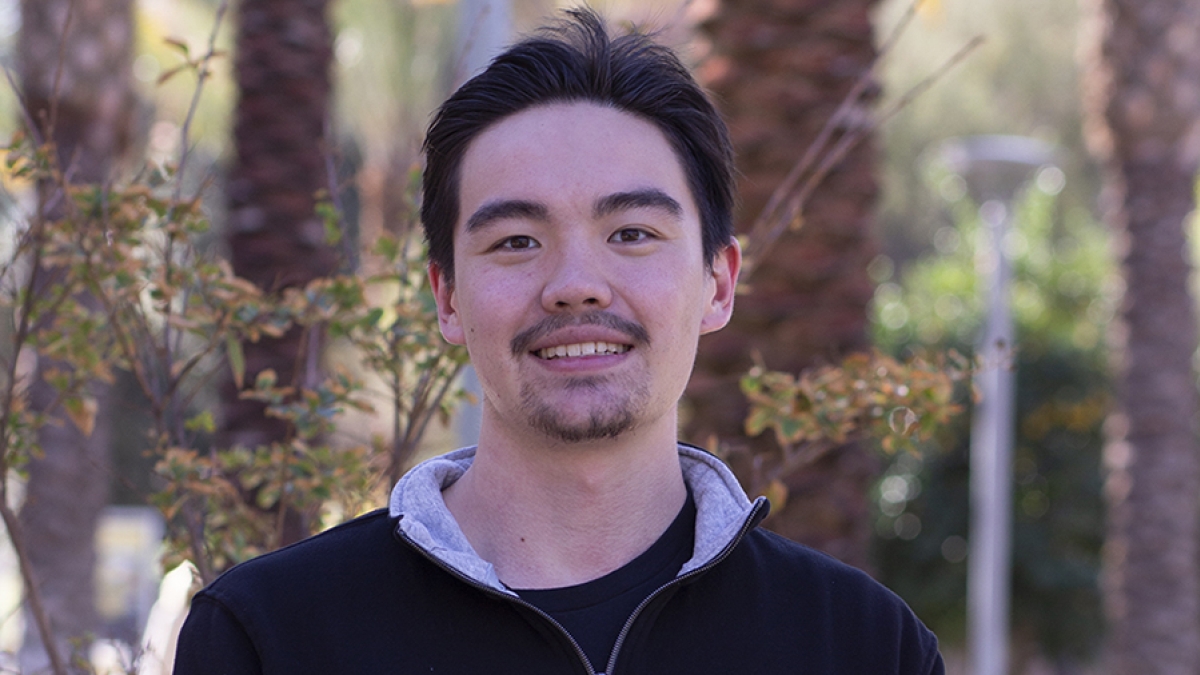School of Molecular Sciences Dean's Medalist on why he chose ASU for PhD

Michael Sauer, School of Molecular Sciences Dean's Medalist. Photo credit: Mariela Lozano
Michael Sauer has a passion for biochemistry and computational mathematical sciences. He graduated from Arizona State University last month with bachelor's degrees in both, as the School of Molecular Sciences Dean’s Medalist.
Dean’s Medalists are the highest achieving students from The College of Liberal Arts and Sciences, having demonstrated a steadfast commitment to academic excellence during their time at ASU.
While at ASU, Sauer conducted research with Professor Mark Hayes of the School of Molecular Sciences on dielectrophoretic particle capture and bolus sequestration of COVID-19 particles in a microfluidic device.
“Michael is an extraordinary young scientist,” Hayes said. “He is intensely curious and able to grasp concepts immediately in a wide range of topics. He has contributed computational and experimental works to our current efforts at generating a paradigm shift for diagnostics, as demonstrated with COVID-19 testing.”
On top of Sauer’s recent work in the Hayes Lab, he has also been involved with Assistant Professor Matthias Heyden's lab, looking at solvation of large proteins using protein dielectrophoresis.
Before that, Sauer conducted research in Professor Matthew Scotch’s lab in the Biodesign Institute’s Center for Environmental Health Engineering.
Sauer won several awards in the School of Molecular Sciences and was a National Science Foundation Research Experiences for Undergraduates researcher during the 2020–21 academic year.
After graduation, Sauer has decided to continue his education at ASU by pursuing a PhD in biochemistry.
When Sauer graduated from high school, he wasn't certain about which direction his career would take.
“ASU provided me with the flexibility to explore different fields. There is also a high level of collaboration at ASU, which has allowed me to see many different fields and select my own career path,” he said.
Sauer never really had an “aha” moment when choosing his field of study, but admits that organic chemistry was a defining moment for him. That was actually the first time he felt like he was having fun learning.
“I never had one big 'aha,' just a bunch of little moments where I found myself having fun as I would work through my chemistry classes,” Sauer said. “I just went with my gut and switched my major to biochemistry. As I continued to explore opportunities inside and outside of the lab, I realized that there is also a lot of auxiliary programming and math that supports problem-solving in chemistry. I consequently added computational math as a second degree. I found it very easy to get excited about math and chemistry. I always felt like I could never learn enough. “
Sauer loves the connections between chemistry and math. He saw a lot of concepts from chemistry pop up in his math classes and vice versa. He explains that if you gave a chemist, an engineer and a mathematician the same problem, they might all attack the problem from a vastly different angle. Sauer readily admits that seeing these different angles from his two separate degree paths has forced him to expand his problem-solving perspective.
Sauer said hes favorite spot on campus for power studying was Wexler Hall, where they have a lot of chalkboards. “Any place with a chalkboard is a favorite spot.”
He said he is beginning his doctoral studies in biochemistry (specifically bioanalytical chemistry) at ASU feeling like there is so much to learn and so many problems to solve.
More Science and technology

ASU students win big at homeland security design challenge
By Cynthia GerberArizona State University students took home five prizes — including two first-place victories — from this year’s…

Swarm science: Oral bacteria move in waves to spread and survive
Swarming behaviors appear everywhere in nature — from schools of fish darting in synchrony to locusts sweeping across landscapes…

Stuck at the airport and we love it #not
Airports don’t bring out the best in people.Ten years ago, Ashwin Rajadesingan was traveling and had that thought. Today, he is…

